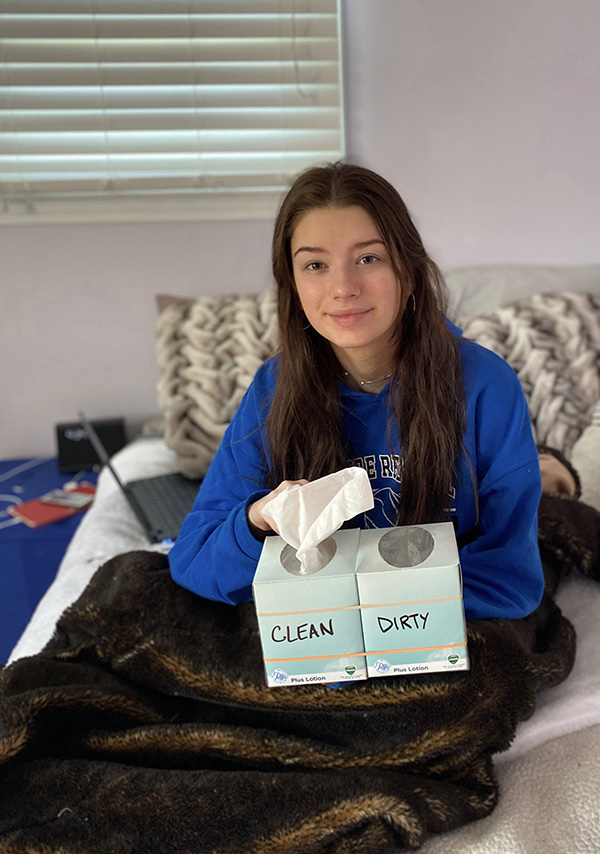
By Jamie Jablonowski
The country currently faces an enemy it cannot see that seems to grow stronger each day. While health care professionals guard the front lines, everyone else wages their own battle at home as they fight to protect their family from the coronavirus, now known as COVID-19.
Our grandparents grew victory gardens. Now it’s our turn to be of service, but how? Local health care professionals have advice about how they are defending their homes.
Lauren Fonseca, a registered nurse from Oceanport, works at the recently opened drive-thru testing centers in New Jersey and New York and takes careful measures to limit the exposure to her family. “I’ve been washing my hands frequently, as well as using hand sanitizer when I can’t get to a sink,” said Fonseca. “Due to my proximity to the virus while working, I make sure to immediately throw my clothes in the laundry when I get home, as well as take a shower. It’s my attempt to help limit transferring any germs.”
Dominique Connolly, a nurse from Lincroft with 22 years of experience and mother of two, makes sure to use hot water when washing her clothes and sets the dryer to high, using heat to help kill the virus. She also makes sure to wipe commonly used services down regularly, including the door handles of the car after food shopping, as well as handles and surfaces in the bathroom and kitchen. “What’s different than usual is I dropped all my organic cleaning products and now I fully Lysol the kitchen,” she said.
For those who may have been unable to stock up on cleaners, the Centers for Disease Control (CDC) states unexpired household bleach will be effective for cleaning as long as it’s appropriate for the surface. It recommends preparing a solution by mixing five tablespoons of bleach per gallon of water.
While at home, Fonseca’s family created a way to ensure no tissue gets left behind. “My niece had an ingenious idea,” she said. “She rubber banded an empty tissue box with a brand new tissue box, that way you can put all the dirty tissues right in the empty box. This prevents the spread of germs caused by leaving tissues around.”
Shanda McManus is a doctor at Family Practice of Middletown with over 20 years of experience. Her husband is also a physician and they have been taking careful precautions to protect themselves and their three children living at home. When she goes food shopping, McManus wears a scarf around her face and winter gloves and sanitizes her hand when she returns to her car. The scarf is a reminder not to touch her face while she is out, she explained.
Connolly also limits food shopping trips. She buys in bulk and freezes half of every meal for future use. This ensures if she or her husband gets sick, there will be prepared meals available in the freezer. She also recommended Misfits Market, a company that will deliver fresh produce for under $25. By utilizing this service, she can make fewer trips to the grocery store and provide her family with fresh fruits and vegetables throughout the week.
Unfortunately, illness is often inevitable, whether it’s a cold, allergies or COVID-19. For those who are experiencing symptoms, McManus recommended calling before heading into the office. “In my office, we are really trying to be available for people,” she said. “We have nurses, we’re answering the phones and covering all questions.” She added, “We’d rather people call and ask us because there is a lot of misinformation.”
Having common household medications on hand can also be helpful. For stuffy noses, “Sudafed is great as long as you don’t have high blood pressure,” McManus said. Connolly keeps Zyrtec in the house; if someone in her family is not feeling well and she thinks it may be allergies, she already has allergy medicine in the cabinet. If symptoms are relieved, she can assume it’s likely something less severe than COVID-19.
In regard to vitamins and supplements, “A gram of Vitamin C tends to shed a half a day to a day of a viral illness, so it won’t hurt, but don’t take mega amounts,” McManus said.
McManus reminds all of her patients to get enough rest, eat healthy while home, and to get exercise to suppor t your immune system.
She also said maintaining a healthy diet when it comes to ingesting news was just as important, as she described her own habit of limiting her intake.
If a family member is sick, McManus recommended they be isolated from the rest of the family as much as possible, including using a separate bathroom, if available. If close contact is necessary, such as driving a relative to a doctor’s appointment, she recommended both the caregiver and symptomatic individual wear a mask to prevent the transmission of respiratory droplets.
All three health care professionals stressed the importance of hand washing, staying home and maintaining social distancing recommendations, emphasizing that they felt the sacrifice was needed to ensure the virus does not overwhelm our health care system.
We all have the opportunity to be of service during this time to support each other, win this war and hopefully enjoy the freedom from isolation and fear come summer.
The article originally appeared in the March 26- April 1, 2020 print edition of The Two River Times.














